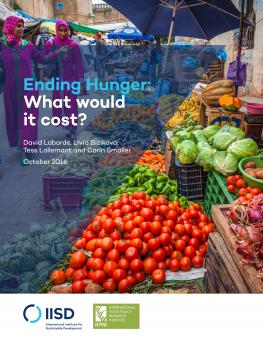
Ending Hunger: What would it cost?
The International Institute for Sustainable Development and the International Food Policy Research Institute joined forces to estimate what it would cost to end hunger, and the contribution that donors need to make.
The International Institute for Sustainable Development and the International Food Policy Research Institute joined forces to estimate what it would cost to end hunger, and the contribution that donors need to make.
Our analysis focused on the cost of ending hunger through increased spending on social safety nets directly targeting consumers, farm support to expand production and increase poor farmers’ income, and rural development that reduces inefficiencies along the value chain and enhances rural productivity. The research marks the first time that a multi-country macroeconomic model has been combined with household surveys.
We found that it will cost on average an extra USD 11 billion per year of public spending from now to 2030 to end hunger. USD 4 billion of the additional spending needs to come from donors. The remaining USD 7 billion will come from poor countries themselves. Importantly, this public spending will generate on average an additional USD 5 billion of private investment per year until 2030.
Participating experts
Additional downloads
You might also be interested in
Tropic Coffee
This case study analyzes the extent to which a small coffee processor and trader in Rwanda complies with international standards for responsible investment in agriculture.
Sénégalaise des Filières Alimentaires
This case study analyzes the extent to which a small rice miller in Senegal complies with international standards for responsible investment in agriculture.
Responsible Agricultural Practices of a Cocoa Buying Company in Ghana
This case study analyzes the extent to which a small cocoa trader in Ghana complies with international standards for responsible investment in agriculture.
Mahembe Coffee
This case study analyzes the extent to which a small agribusiness in Rwanda complies with international standards for responsible investment in agriculture.